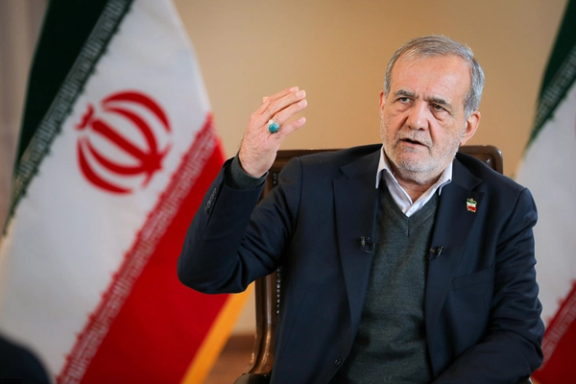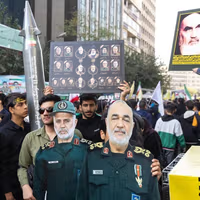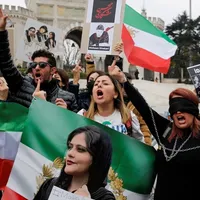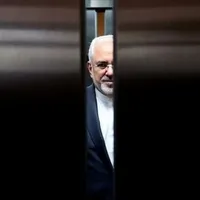Iranian Artists Call For Boycott Of Regime’s Culture Ministry
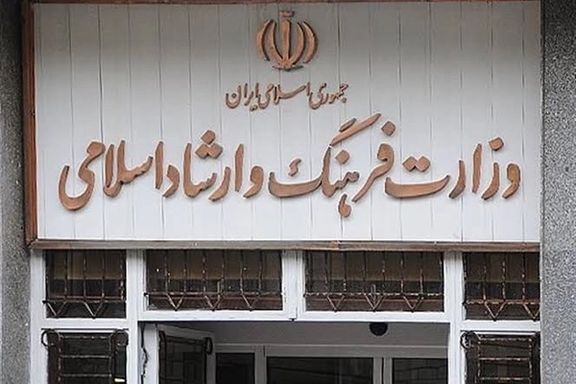
A group of Iranian artists have called on their peers and writers to boycott the Iranian culture ministry and to defy the censors.

A group of Iranian artists have called on their peers and writers to boycott the Iranian culture ministry and to defy the censors.
In a statement, the activists calling themselves "Art/Culture/Action" center said: "We urge all the artists, writers, publishers, and those involved in Iranian film-making and drama not to recognize the cultural monitoring, to stand against the unjust censorship."
The signatories said that they will no longer seek permission from government institutions for any artistic and intellectual activity, including setting up exhibitions, publishing books and magazines, and making and screening movies.
The Art/Culture/Action Center introduced itself on Instagram as "a group comprising a number of Iranian art practitioners" that "was formed with the aim of supporting political, and civil freedom in Iranian art society".
During the nationwide protests following the killing of Mahsa Amini, many writers and artists expressed support for the demonstrators. Scores of writers and translators also announced that they would no longer cooperate with the ministry of culture.
As Tehran International Book Fair gets underway, many publishers and people have boycotted the fair according to reports.
Last year, dozens of Iranian writers and poets announced they will publish their works without submission for approval by the Islamic Republic, until censorship stops in Iran.
The announcement titled “We the literary” was published by a Canadian Iranian writer, Fereshteh Molavi, but it is signed by writers from Iran and the diaspora.
The clerical government in Iran requires all books, films and music be submitted for review or be censored before publication or screening. Works by artists perceived to have dissident ideas usually get rejected and others are altered to fit the religious and political boundaries of the authoritarian regime. Some books have been in limbo for years, waiting for permission.

British Iranian activist Vahid Beheshti has revealed that a fatwa calling for his death has been issued by a cleric in the Islamic Republic.
Recovering in hospital from a hunger strike of more than two months, the campaigner posted a video Tuesday saying: “Through my contacts in Iran, I have been given this latest information that the religious platform for my death has been issued by one of the clerics of Islamic Republic of Iran connected to IRGC.”
A defiant Beheshti added: “If you release 10 fatwas for my death. We won't stop our activities. We wouldn't step in this path.”
He has been in hospital since May 5, before which he had survived for 73 days on nothing but water, coffee, salt and sugar cubes.
His hunger strike outside the British Foreign Office in London had been devoted to raising awareness about atrocities committed in his homeland and to pressure UK Prime Minister Rishi Sunak to proscribe the IRGC as a terror group, Beheshti described it as “the most brutal mafia in the world”.
Beheshti said Sunak's government should not wait any longer to proscribe the IRGC but rather move forward now.
The activist warned if ministers refuse to act, IRGC agents will eventually force them to do so: “If they come to the streets of London and do something tragic, then it’s too late to wake up.”
Beheshti is not the only UK citizen under threat from Tehran. MI5, the UK's domestic security agency, revealed last year that at least ten Iranian plots to kill or abduct British citizens had been discovered.
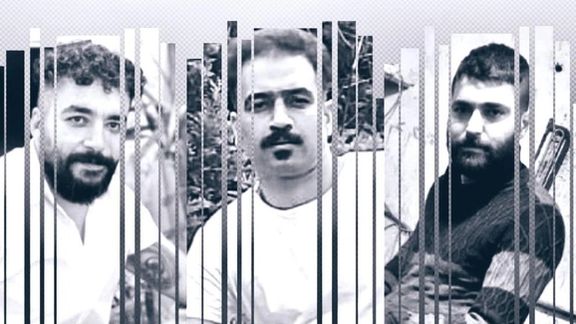
Iranians abroad are calling for protests over the imminent execution of three political prisoners tortured into confessions by the Islamic Republic.
The families of Majid Kazemi, Saleh Mirhashmi, and Saeed Yaqoubi and human rights campaigners say there is no evidence against them.
The state broadcaster’s local TV channel in Esfahan (Isfahan) – where the three are being held – aired footage of their forced confessions on Monday night, adding to growing fears that they are about to be hanged.
The prisoners’ relatives were reportedly told by the court of appeal not to come back to the judiciary’s office because “the prosecutor of Esfahan wants to execute these three protestors.”
Iranian expatriate communities plan to pour onto streets of their hometowns for demonstrations against the executions by the Islamic Republic on Saturday, May 20.
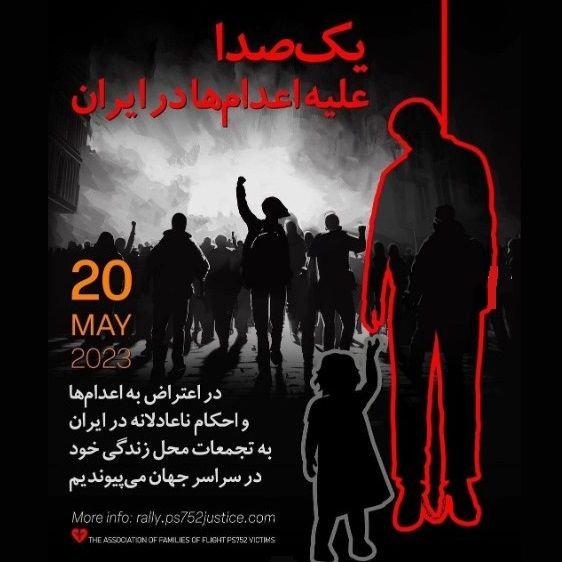
Canada-based dissident figure Hamed Esmaeilion, whose daughter and wife were killed in the shooting down of Flight PS752 by Iran’s Revolutionary Guard in 2020, is among the organizers of the event, dubbed “Unanimous Against Executions in Iran.”
The three prisoners' families have repeatedly stated that there is no reliable evidence implicating the three in the death of two IRGC’s Basij militia members and a police officer in protests of November last year, in what Persian media have dubbed the ‘Esfahan House’ case.
There are a number of discrepancies in the prosecution case, including the time of the killings and the fact that the murder weapons described by the judiciary do not match the details of the confessions.
According to an audio file released on Sunday of Kazemi talking to his cousin, he was coerced into confession by threats to his family of rape and death.
The prisoners were allowed to meet their families on Sunday night, further fuelling speculations that their execution is imminent. An organized pro-regime Twitter campaign has been launched, urging the authorities to carry out the execution.
Fars news agency, affiliated with the IRGC, ran a piece on its website on Tuesday, claiming that foreign-based media – deemed hostile by the regime – have been trying to stop the justice being meted out to the prisoners.
On Sunday, protesters against the executions gathered overnight outside Esfahan’s prison. Videos posted by activists show dozens chanting slogans in front of the prison, while gunfire was also heard as thick smoke caused by teargas enveloped the area.
Opposition activists say the death penalty is being used against the Esfahan House three as an intimidation tactic to stop further protests.
The United Nations said last week that Iran has executed 209 people so far this year, calling the record "abominable".
Earlier in the month, Amnesty International urged Iran to drop the execution of the three as well as that of six ethnic Arab men who gave “tortured-tainted” confessions.
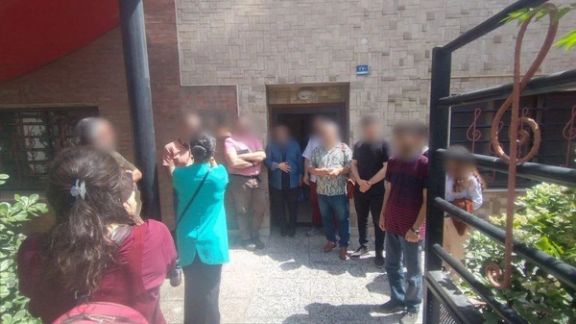
Iranian musicians have demonstrated outside the House of Music in Tehran in protest over security forces’ attack on students.
It follows the raid on Saturday on the University of Tehran’s Faculty of Fine Arts on the pretext of women not complying with the mandatory hijab.
Students and teaching staff were beaten up and some had their instruments broken.
On Monday, the board members of Iran House of Music slammed the violent behavior of security guards at the Tehran University faculty.
The Telegram channel of the Students' Union Councils reported that the security officers clashed with some female students. Demonstrators chanted slogans “Woman, Life, Freedom”, “Student Will Die, But Will Not Be Humiliated”, and “Death to the Leader”.
Iran's universities have been one of the main centers of protests during the nationwide uprising against the regime following the death of Mahsa Amini in police custody last year. In an attempt to suppress the demonstrations, the security forces of the Islamic Republic have repeatedly attacked the universities and arrested over 700 students.
The repression of the protesting students in recent months has provoked widespread criticism by human rights organisations and governments around the world.

Streets in Vienna and Frankfurt are to be named after Mahsa Amini, whose death in custody last year sparked protests across Iran.
The decision in Vienna was announced by representatives of the governing Austrian parties SPÖ and Neos on Monday at a solidarity campaign.
This is the first street in the world to be named after Amini, the 22-year-old who died after her arrest by the morality police in Tehran for defying hijab rules.
The SPÖ and Neos will introduce a resolution at the upcoming municipal council meeting on May 24that calls for the nomination.
The two parties also demanded an immediate stop to executions in Iran and the abolition of the death penalty, along with the immediate release of political prisoners, an end to violence against the population and compliance with freedom of assembly and freedom of the press.
SPÖ municipal councilor Marina Hanke said: "Pictures have been going around the world for months, pictures of women in Iran who are taking their freedom, their rights and their space."
Dolores Bakos, spokeswoman for Neos in Vienna, said: "We must ensure that the cry of these courageous people for freedom, for democracy and respect for human rights does not go unheeded.”
In Frankfurt, mayor Narges Eskandari announced the city will change the name of the street where the Iranian consulate is located to Mahsa Amini.
Eskandari said from now on all correspondence to the consulate can bear Amini’s name, and even the consulate staff will have to write her name on their documents.
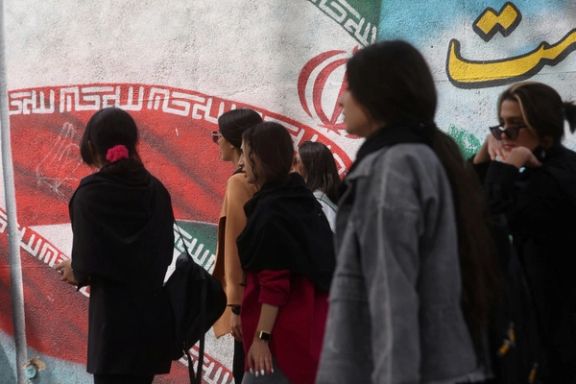
Iran's Cyber-Police (FATA) has threatened women fashion businesses, surgery clinics and gyms with closure over unveiled photos in their social media content.
Ramin Pashaei, deputy chief of FATA, said Monday Cyber Police aims at “clearing the [Persian language] cyberspace of immoral content” and warned that any social media content considered “outside norms and against moral standards” would bring about prosecution.
Authorities accuse boutiques, beauty salons, modelling agencies, gyms and plastic surgery establishments of encouraging women not to wear the hijab by their “immoral” content. FATA on some occasions in the past has prosecuted them or forced them to shut down their accounts.
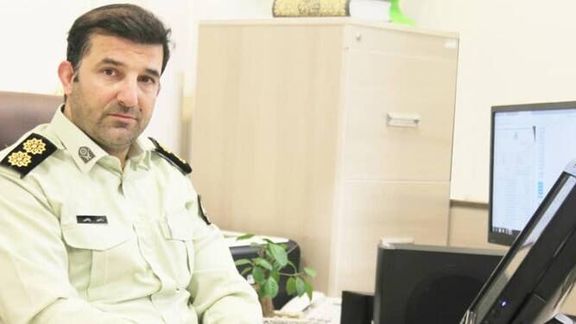
Last week an official of the “Basij-Militia of Retailers”, Gholamreza Hasanpour, told the semi-official Mehr News Agency that female sales staff should wear uniforms to work but have been given a “choice” of one hundred different designs to choose from.
Unveiled girl protesting against compulsory hijab by performing gymnastics on the streets of Boukan in western Iran.
Women’s defiance of hijab rules has a history as long as the Islamic Republic itself, but it has escalated to new levels since the death of 22-year-old Mahsa (Jina) Amini in custody of morality police for “improper hijab” sparked nationwide protests.
Protests gradually subsided after several months but defiance of hijab rules as a form of civil disobedience has forced the government to try to stop the anti-compulsory hijab movement by taking various measures.
Such measures include preventing defiant women from using public transportation, entering government offices and boarding planes, shutting down shops and shopping malls as well as various plans to “encourage and convince” them to wear the hijab such as billboards and banners extolling “hijab and chastity”.
One such banner put up by the ministry of Islamic Guidance and Tehran International Bookfair last week quoted the 19th century Russian writer Leo Tolstoy as saying that corruption, sexual derangement, and lack of hijab caused profusion of divorces in Europe. Another banner they have put up quoted 19th century French author Victor Hugo praising modesty of women and its allure for men.
“It's hilarious when you have to fake quotes from Tolstoy and Hugo about hijab because half of your own population is ignoring you,” London-based journalist Shayan Sardarizadeh tweeted.
Pressure on activists and prosecution of celebrity artists for defiance of hijab in public and through social media are among the other measures the regime has been employing to scare women into wearing the hijab.
Sepideh Rashno, a 28-year-old art student whose defiance of hijab rules and heated dispute with a hijab enforcer on a city bus landed her in prison in July last year, a few months before the Mahsa protests, was suspended from Alzahra University in Tehran due to "non-observance of the Islamic hijab" last week for two semesters.
"As a citizen, I have the right to choose the clothes I wear,” she wrote in response to the decision, adding that she planned to return to the university after her suspension “in my preferred outfit”, that is, unveiled.
Pundits have said the regime’s determination to reinforce strict hijab rules is political in nature. Vice President in Legal Affairs Mohammad Dehghan on Sunday confirmed such theories. “The Islamic Republic will not mean much if there is no hijab in the country,” he said.
On April 4 at a meeting with state officials Tuesday, Khamenei claimed that foreign intelligence services were encouraging Iranian women to disobey mandatory hijab.
“Discarding hijab is haram based on Sharia and also politically,” he declared. His declaration was a clear signal to authorities that they need to do anything it takes to re-establish control over women which has somehow waned following anti-regime protests.
“The order given by his excellency is clear,” Parliament Speaker Mohammad-Bagher Ghalibaf said a day after Khamenei’s speech while promising to give precedence to any hijab-related motion or bill.
